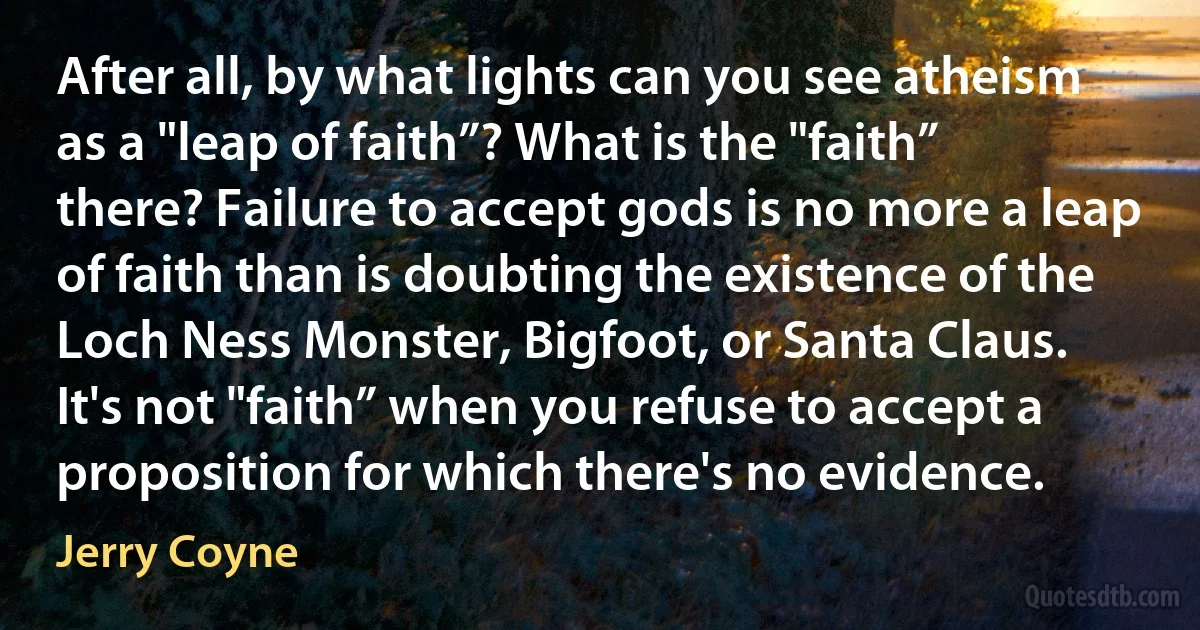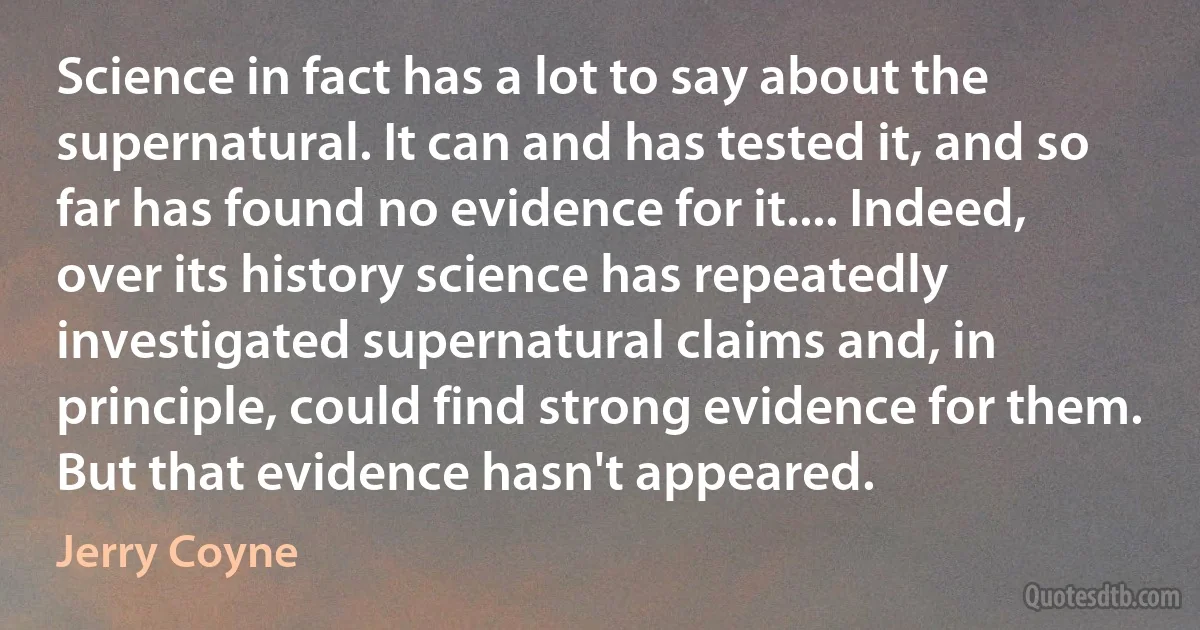Evidence Quotes - page 28
I will have achieved my aim if, by the end of this book, you demand that people produce good reasons for what they believe-not only in religion, but in any area in which evidence can be brought to bear. I'll have achieved my aim when people devote as much effort to choosing a system of belief as they do to choosing their doctor. I'll have achieved my aim If the public stops awarding special authority about the universe and the human condition to preachers, imams, and clerics simply because they are religious figures. And above all, I'll have achieved my aim if, when you hear someone described as a "person of faith,” you see it as criticism rather than praise.

Jerry Coyne
I could go on, but the point is clear: religions make explicit claims about reality-about what exists and happens in the universe. These claims involve the existence of gods, the number of such gods (polytheism or monotheism), their character and behavior (usually loving and beneficent, but, in the case of Hindu and ancient Greek gods, sometimes mischievous or malevolent), how they interact with the world, whether or not there are souls or life after death, and, above all, how the deities wish us to behave-their moral code.
These are empirical claims, and although some may be hard to test, they must, like all claims about reality, be defended with a combination of evidence and reason. If we find no credible evidence, no good reasons to believe, then those claims should be disregarded, just as most of us ignore claims about ESP, astrology, and alien abduction. After all, beliefs important enough to affect you for eternity surely deserve the closest scrutiny.

Jerry Coyne
This shows what we already know: belief may arise by indoctrination or authority, but is often maintained by social utility. But if no conceivable evidence can shake your faith in a theistic God, then you've deliberately removed yourself from rational discourse. In other words, your faith has trumped science.

Jerry Coyne
If Hawking's world is "small,” well, at least what he found was testable, and might be true. Father de Souza's claims are either untestable or have already been shown to be doubtful, and he has no evidence for any of them. In requiring people to believe fairy tales, de Souza's world is not just small, but nonexistent.

Jerry Coyne
While our view of the world is filtered through our senses, evolution has, by and large, molded those senses to perceive the world accurately, for there's a severe penalty to be paid for seeing things wrongly. That holds not only for the external environment, but also for the character of others. Without accurate perceptions, we couldn't find food, avoid predators and other dangers, or form harmonious social groups. And following those perceptions is indeed the pursuit of "true beliefs”: beliefs based on evidence. Natural selection doesn't mold true beliefs; it molds the sensory and neural apparatus that, in general, promotes the formation of true beliefs.

Jerry Coyne
The harm, as I've said repeatedly, comes not from the existence of religion itself, but from its reliance on and glorification of faith-belief, or, if you will, "trust” or "confidence”-without supporting evidence. And faith, as employed in religion (and in most other areas), is a danger to both science and society. The danger to science is in how faith warps the public understanding of science: by arguing, for instance, that science is based just as strongly on faith as is religion; by claiming that revelation or the guidance of ancient books is just as reliable a guide to truth about our universe as are the tools of science; by thinking that an adequate explanation can be based on what is personally appealing rather than on what stands the test of empirical study.

Jerry Coyne
Theists' typical response to these failures (i. e., of prayer to affect rates of healing) is to say either "God won't let himself be tested” or "That's not what prayer is about: it's simply a way to converse with God.” But you can bet that had these studies shown a large positive effect, the religious would be noisily flaunting this as evidence for God. The confirmation bias shown by accepting positive results but explaining away negative ones is an important difference between science and religion.

Jerry Coyne
Atheism-at least the refusal to accept gods for which there's no evidence-is a logical outgrowth of science, and explains (at least to me) why, compared to Americans as a whole, scientists are so much more atheistic. If your career depends on establishing your confidence in a phenomenon proportional to the degree of evidence supporting it, then God is a no-go. The climate of doubt that is endemic-and essential-to the scientific enterprise is a true disaster for religion. Religious people know this, and that largely explains the many ways they attack science.

Jerry Coyne
Since neither Robbins, nor Hart, nor any other Sophisticated Theologian™ or Hipster Poet has produced any evidence for God that would convince someone who wasn't already a believer or an incipient believer, we needn't take their claims seriously. The reason people like Robbins sneer at the New Atheists' call for evidence is because believers don't have any.

Jerry Coyne
Religion claims to help us understand things about the universe, but, unlike science has no way to test or verify its claims. Both science and religion compete to understand reality, but only science has the method to verify its findings, while religion merely buttresses emotional and epistemic commitments made in advance, commitments impervious to evidence.

Jerry Coyne
In the end, religious investigations of "truth,” unlike those of science, are deeply dependent on confirmation bias. You start with what you were taught to believe, or what you want to believe, and then accept only those facts that support your prejudices. This is the basis for the theological practice of "apologetics,” designed to defend religion against counterarguments and disconfirming evidence....In contrast, science has no apologetics, for we test our conclusions by trying to find counterevidence.

Jerry Coyne
It would be very convincing to say that there's no hope for movies - that audiences have been so corrupted by television and have become so jaded that all they want are noisy thrills and dumb jokes and images that move along in an undemanding way, so they can sit and react at the simplest motor level. And there's plenty of evidence, such as the success of Alien. This was a haunted-house-with-gorilla picture set in outer space. It reached out, grabbed you, and squeezed your stomach; it was more gripping than entertaining, but a lot of people didn't mind. They thought it was terrific, because at least they'd felt something: they'd been brutalized. It was like an entertainment contrived in Aldous Huxley's Brave New World by the Professor of Feelies in the College of Emotional Engineering.

Pauline Kael
Of all the religions ever devised by the great practical jokers of the race, [Christianity] is the one that offers most for the least money, so to speak, to the inferior man. It starts out by denying his inferiority in plain terms: all men are equal in the sight of God. It ends by erecting that inferiority into a sort of actual superiority: it is a merit to be stupid, and miserable, and sorely put upon-of such are the celestial elect. Not all the eloquence of a million Nietzsches, nor all the painful marshalling of evidence of a million Darwins and Harnacks, will ever empty that great consolation of its allure. The most they can ever accomplish is to make the superior orders of men acutely conscious of the exact nature of it, and so give them armament against the contagion.

H. L. Mencken



